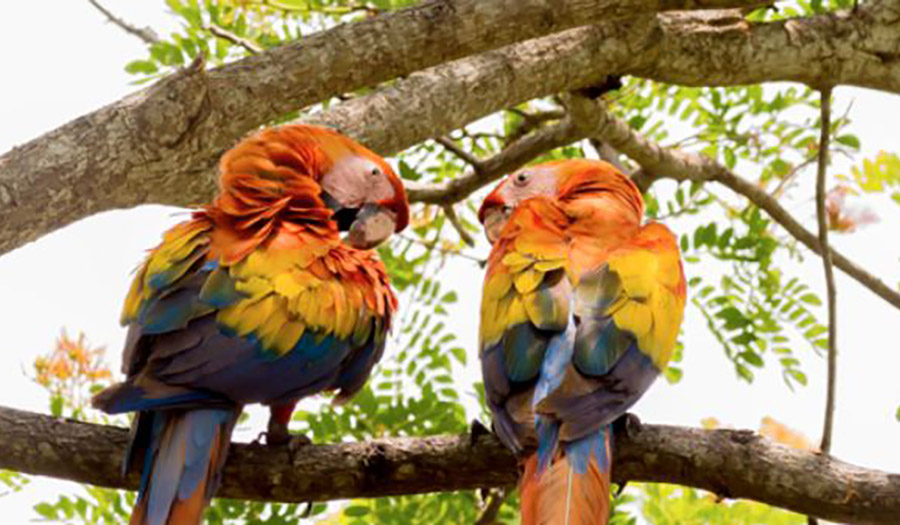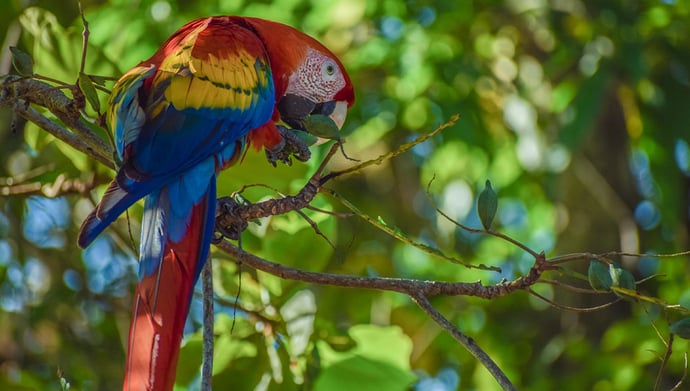We can often observe the bright and cheerful red macaw flying over Hotel and Club Punta Leona. However, the story could have been very different if there had been no intervention by a group of people and Hotel and Club Punta Leona, who knew they were facing the possible disappearance of the species.
In Costa Rica, the loss of the tree species on which they feed, as well as the ruthless hunting of the "laperos" (macaw hunters) in the eighties and early nineties significantly decreased the population of these birds to reach alarming rates.
Emergency lights
The warning lights came on when after a series of counts in the early 1990s; specialists calculated that the number of birds of this species was decreasing by more than eight per year. Thus, in about 5 years it could have been considered extinct if nothing were to be done.
This forced us to work on the implementation of protection strategies, promoted and supported mainly by Hotel and Club Punta Leona and the Universidad Nacional (National University).
“Thanks to the support of the Hotel, we managed to summon more than 20 people, including hotel employees, school teachers, tourist guides, community leaders, scientists and even a couple of laperos who proposed implementing different measures from their distinctive fields to save the species”, explained Christopher Vaughan, biologist in charge of the project.
Let's do it
Thus, the Association for the Protection of the Red Macaw was created which together with the Hotel and Club set out to eliminate the hunting of macaws and increase their population, improve their habitat, establish education programs for the community promote the project and finance it.
The Hotel and Club was dedicated to the reforestation of tree species in which the macaws feed or make their nests. 15 artificial nests were established in our facilities, which joined the 56 natural nests that had been detected by the researchers.
“Over time we began to see an increase in the number of young macaws flying with their parents, and the total number of macaws began to increase. In a year the number of chicks detected doubled “said Vaughan.
Of the 300 counted in 1994, the figure has grown to about 500, which demonstrates the effectiveness of the actions that have been implemented during these past 25 years.
The Present is Promising
Hotel and Club Punta Leona continues to plant beach almond trees and other species every year, which constitute the main food of this species, place artificial nests, maintain its environmental education programs in schools and most recently implemented a monitoring system of nests by means of cameras that transmit 24 hours and can be seen by anyone.
At present it is estimated that around 70 macaws are maintained in Hotel and Club Punta Leona. According to the records, these are mobilized between Guacalillo, Tárcoles, Carara National Park and Bijagual.
Only monitoring in the world
According to Vaughan “thanks to the cameras we can see the entire cycle of reproduction of the macaw, which not only has great scientific value, but most importantly gives everyone access to see them from when they lay the egg, to hatching, feeding, growing and leaving the nest. I’m sure that we are the only ones in the world doing it”
Thousands of hours of recording have given extraordinary results, capturing the entire reproduction process of this species, from the choice of the nest, the competitors, the mating, nesting, the chick’s growth and abandonment of the nest.
These videos have a great educational and scientific value, so the objective has been to share them with the general public on the YouTube channel of the hotel and to serve as audiovisual material in environmental education programs.
Macaw hunters
Part of the strategy of this conservation program has been to employ the locals in tourism and to offer them a better paid source of employment. The Program has ex macaw hunters; one of them is Wilberth Vargas, who at the time was dedicated to stealing and selling them on the black market. Now he works with Christopher Vaughan, takes advantage of his experience and makes and places artificial nests.
"It’s dirty money selling animals and it’s just not worth it, so when I started to work in Punta Leona and met Mr. Christopher, I accepted his offer to make artificial nests and place them in trees," said Wilberth.
Commitment to the Macaws
Over the years there have been many people who have selflessly contributed to helping get the red Macaw out of danger today. We especially wish to thank the following for their work:
Arq. Eugenio Gordienko
Miguel Fernández
Humberto Solorzano
Lizbeth Mora
Luis Guillermo Hernández
Nicole Nemeth
Mark Myers
Roy Arroyo
Leonel Marineros
Fiona Dear
Teachers and park rangers
Other donors:
Hotel y Club Punta Leona
The Wildlife Trust
Universidad Nacional
OEA
Idea Wild
The Parrot Society-UK
MEP
SINAC



